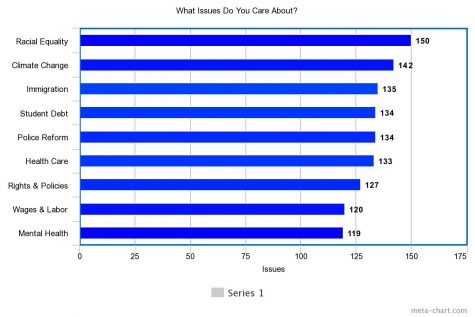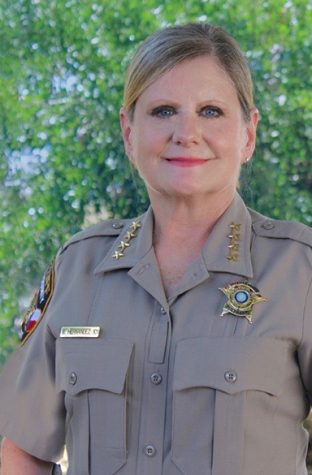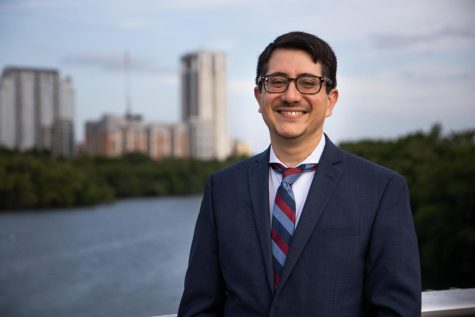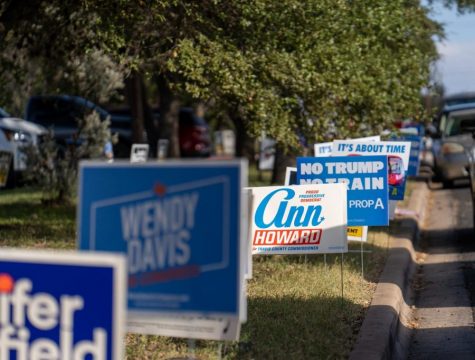Hilltoppers Vote: Q&A with Travis County District Attorney candidate Martin Harry
Q: Why are you running for district attorney in Travis County?
A: I decided to run because I was growing increasingly concerned about problems of crime and homelessness in our city. It seemed to me that these problems were getting worse because of wrongheaded policies by public officials and politicians in our city and county that seem to be designed to cultivate a culture of lawlessness. I see a direct link between this lack of respect for law and law enforcement and the increasing crime that we’re seeing, not only in Austin, but in other cities around the nation. Law and order is essential in our free society, for our peace or prosperity or freedom. And public safety depends on voluntary compliance, because we don’t live in a police state. So the extent that we have public safety depends on people voluntarily complying with the law. That voluntary compliance is dependent on people having respect for the law and law enforcement, and the more people lose respect for law enforcement, then you have less compliance. With less compliance, that means we have more crime and less public safety. To the extent that I see our public officials adopting policies that erode public respect for the law and law enforcement, I think it’s leading to the erosion of safety.
Q: How does your background uniquely qualify you to be a district attorney?
A: The breadth and depth of my experience makes me the better qualified candidate for district attorney. I started my legal career as a Navy Judge Advocate; I went on active duty from law school. After I passed the bar exam, I served in several different capacities. While in the Navy, I served in administrative or executive-type positions. But I also gained my litigation experience and my criminal litigation experience, where I serve both as a prosecutor and as a defense counsel. I’ve worked on both sides. After I left the Navy, I went to work for the security administration briefly, and then I moved to Austin and started up my own law practice. In the course of that law practice, I have represented thousands of clients of all backgrounds and all walks of life. I’ve actually helped disabled Texans obtain benefits to which they were entitled, not just from Social Security, but other programs as well. That experience gave me a greater appreciation for some of the problems that people with disabilities encounter not only with government, but in life in general. My opponent, Mr. Garza has never prosecuted anyone; he has limited experience serving as a public defender. And I think it’s admirable work. I applaud his service as a public defender. But it is not the same thing as the prosecutor. The experience that I gained as a prosecutor that you don’t get as a defense counsel is you gain a greater appreciation for the impact of crime on victims because you’re not only representing the state, but you’re representing the interests of those victims. The problem I see is that [Garza] has kind of a jaded perspective because his experiences are exclusively on one side, and I benefit from having the experiences of a prosecutor.
Q: 94% of the St. Edward’s student body that partook in a recent survey listed police reform as a top issue. As DA, what will your priorities be and how will you handle police reform?
A: What I am not going to do is to demonize the police as a class. I think that’s bigotry. Bigotry towards anyone or any class of individuals is wrong. And that’s the stance that I take with Mr. Garza, of taking a particular approach to cases where the defendant is a police officer, that might be different than where the defendant is someone other than a police officer. I don’t think a police officer should be benefited, advantaged or disadvantaged by virtue of their status. In some instances, even though their status may have a bearing on things, a police officer has more authority to use force than I do as a private citizen. So when there’s a use of force, the law is going to be a little bit different when it comes to a police officer, but that there are certain evidentiary rules or judicial rules that compel compliance with the defendant’s rights. If a police officer has a history of misconduct that defense can use for impeachment purposes, then that evidence is going to be something that we are obligated to disclose to the defense. I disagree with Mr. Garza’s plan to have a “do not call list.” If you and I are doing our jobs, and someone is putting us on a list that’s going to impact or impair our ability to do our job, I think we would demand to have some say, and whether we are rightfully being put on that list or not, I don’t think that we should be looking at this as a choice between holding police accountable for everything, or holding the police accountable for nothing – I think we need to use common sense, and how we approach police misconduct and the judicial rules that are in place are pretty stringent about holding our police accountable.
Q: You mentioned rehabilitation as part of your platform for DA. Could you expand on that for readers?
A: I think we’re failing to do enough of prevention and rehabilitation. And I believe in the old adage that an ounce of prevention is worth a pound of cure, that if we can prevent crime, then we’re now only benefiting those who would otherwise be involved with the criminal justice system and any burden that they would experience from that. But we’re also protecting the potential crime victims from being offended and affected by crime. And so there’s not only the individual interests that are promoted, but the community as a whole because you have a safer community. We can look at the case of Eric Mitchell, the man who assaulted two individuals on S. Congress Ave. We have the case of Dylan Woodburn, who stabbed Jonathan Aguilar on S. Congress Ave. If you look at their records, they both have long records of long criminal history. But if you look at their records, what appears to me is that they both have mental impairments. And these are mental impairments that were not properly identified and addressed on any of those prior cases. So, I think we need to do a better job with that; I think we need to use a criminal justice system to do it. That’s one of the complaints I have with Mr. Garza’s approach. His anti-law enforcement policy would preclude us from identifying these individuals.
Q: You point out the top two issues of cash bail which are, one, that poor defendants aren’t able to pay the bail and, two, it deprives someone of their liberty before being proven guilty. However, you are pro-cash bail. What is your solution to handling cash-bail with these issues present?
A: I think that when we have a problem with bail is because of the way it’s being administered. Bail is not a tool of oppression that Mr. Garza says it is. Bail is a constitutionally protected right that protects all of us against abuses of power by the government. If you eliminate bail, then we are losing protection. So it’s not something where just a person’s economic status is involved, it makes it easier or harder for them to regain their freedom. Under the law, judges must take into account a person’s ability to make bail. In my view, if you have someone who’s being denied a right, the answer to that isn’t to deny everyone the right, but to vindicate the right for whom it is being denied.
Q: And on the issue of Black Lives Matter, which you have quite an extensive section of on your campaign website, you say that we must focus on what unites us, not on what divides. Do you believe that if we don’t focus on what divides us, what divides us won’t ever be fixed?
A: So, you know, my concern is that we, — all of us — regardless of our race or ethnicity, all have an interest in public safety. It should be really a nonpartisan issue. I mean, we are all at risk of being victimized, regardless of party, regardless of who we are, you know, and frankly, if you stop enforcing the laws, and it results in more crime, the people that are going to be more likely to be disproportionately victimized are people of color and poor people, because they live in the communities where there’s more crime.
Q: Readers want to know what your stance on immigration is, and as a district attorney, how do you plan to treat undocumented persons in Travis County?
A: Well, I believe that the law needs to be enforced. It’s legally and ethically required to be enforced. No one should be shown any given advantage or disadvantage based on their status. I don’t believe that people who are here illegally should be given special treatment because of that status. Why should someone who is here illegally have charges dropped and dismissed because of their status compared to someone who is a legal resident or a citizen? I think that is discriminatory conduct. On the other hand, I’m not advocating that someone who is here illegally should be treated any worse than those who are here legally. We are a nation of laws. I think we all have, not just an interest in public safety, an interest in maintaining the rule of law. Once you start allowing discrimination based on status, then what you are implicitly communicating to everyone in our society is that it’s okay to discriminate for any reason. You simply cannot claim to be against discrimination while advocating for discrimination. It is just illogical. We have a greater number of people actually advocating race consciousness, whereas when I was growing up, I was taught that we should be treating people based on the content of their character, not the color of their skin, that we should be striving for equality under the law. And I see some people are advocating just the opposite. They’re advocating for race consciousness, that is, and they will even go to the extent of the art to argue that if you are advocating equality, that you are now the racist. I think it’s just perverse.
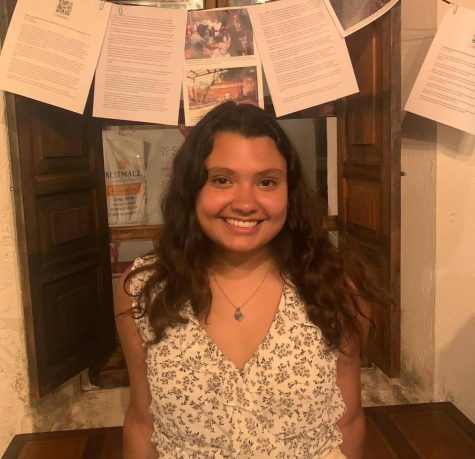
Nina Martinez is a senior at St. Edward’s University, earning her Bachelor’s in Writing and Rhetoric. Martinez has reported and edited for Hilltop...


